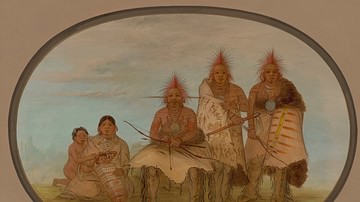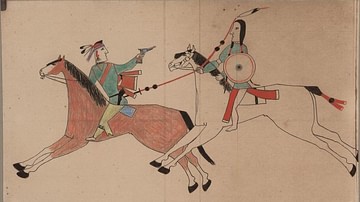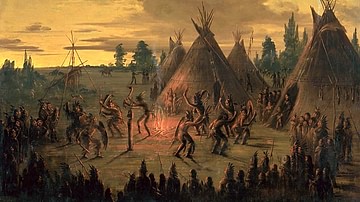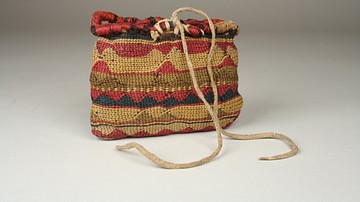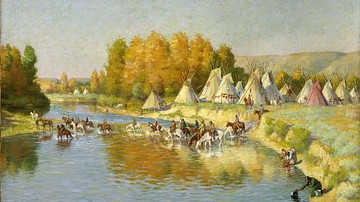The Bear Man is a Pawnee legend exemplifying the Native American understanding of the natural world and serving as an origin tale for the Bear Dance, which was performed to awaken the bears in spring from their winter hibernation and also to celebrate the season of choosing a mate. The Bear Dance is still performed by the Pawnee today.
The bear holds special significance for the Pawnee, as well as other Native American nations including the Ute, as a powerful animal and one of the Nahu'rac – the creatures who serve Ti-ra'wa ("Father Above"), as messengers and mediators – and who are considered brothers by various indigenous peoples. According to scholar Bobby Lake-Thom:
The Bear is always a good sign and a special power. He represents wisdom, insight, introspection, protection, and healing. If you see a Bear while hiking in the woods or along the river, then you know that a very sacred place is nearby. (78)
In The Bear Man, a father, concerned for his son, makes friends with a bear cub in hopes that the Nahu'rac will remember his kindness and look after his boy. Later in life, the Nahu'rac bears remember this kindness and repay it by bringing the boy back to life after he is killed in battle and teaching him their spiritual "medicine" (powers). The story shares similarities with other famous Pawnee tales including A Story of Faith and The Boy Who Was Sacrificed, which also feature the supernatural entities of the Nahu'rac.
The Bear Dance
In Native American belief, generally speaking, there is no spiritual difference between a human being, a plant, a tree, an animal, or a rock, as all things are imbued by the Creator with the same resonant energy. Humans are in no way superior to the natural world but are expected to act as stewards and care for their environment as they would for their own family and community. The Bear Dance grew out of this understanding as the dancers, as they perform wearing the bear hides which have been gifted to them by their bear relatives, become those bears and offer to others bear wisdom, healing, and power. Scholar Larry J. Zimmerman writes:
For Native North Americans, the boundaries between the world of the spirits and the world of living people were not clearly defined: a third "in-between" world of transition separated them. Every entity to some degree inhabited all three of these worlds. If a human carried out the appropriate rituals, he or she could be transformed into a being from one of the other two worlds.
Such transformations often duplicated events of the "beginning time" when the world came to be as it is through the agency of culture heroes and tricksters. On ceremonial occasions, an individual might assume the appearance of such a figure and be thought, literally, to become that being. When a holy man put on a yellow bear hide, for his audience he actually was the bear. (126)
The Bear Dance was (and is) always performed in the spring, waking the bears from their hibernation, and signaling the time for young men and women to choose mates. Among the Ute and Pawnee, the traditional roles of festivals are reversed at this time as men, instead of women, prepare the area for the dance, and women, instead of men, initiate the dance to find a suitable mate. The Bear Dance may last ten days to two weeks and honor the spirit of the bears as much as that of the community and the natural world at large.

Text
The following text is taken from Pawnee Hero Stories and Folk-Tales by George Bird Grinnell, first published in 1889. As noted, one of the functions of the story is to explain the origin of the Bear Dance, which, according to the tale, is inspired by the he-bear and she-bear who give of themselves to bring the boy back from the land of the dead and teach him the secret-which-is-no-secret: that all the inhabitants of Earth are related, come from the same Creator, are deserving of equal respect, and have much to offer each other.
THERE was once a young boy, who, when he was playing with his fellows, used often to imitate the ways of a bear, and to pretend that he was one. The boys did not know much about bears. They only knew that there were such animals.
Now, it had happened that before this boy was born his mother had been left alone at home, for his father had gone on the warpath toward the enemy, and this was about five or six months before the babe would be born. As the man was going on the warpath, he came upon a little bear cub, very small, whose mother had gone away; and he caught it. He did not want to kill it because it was so young and helpless. It seemed to him like a little child. It looked up to him, and cried after him, because it knew no better; and he hated to kill it or to leave it there.
After he had thought about this for a while, he put a string around its neck and tied some medicine smoking stuff, Indian tobacco, to it, and said, "Pi-rau' – child, you are a Nahu'rac; Ti-ra'-wa made you and takes care of you. He will look after you, but I put these things about your neck to show that I have good feelings toward you. I hope that when my child is born, the Nahu'rac will take care of him, and see that he grows up a good man, and I hope that Ti-ra'-wa will take care of you and of mine." He looked at the little bear for quite a long time, and talked to it, and then he went on his way.
When he returned to the village from his warpath, he told his wife about the little bear, and how he had looked at it and talked to it.
When his child was born it had all the ways of a bear. So, it is among the Pawnee. A woman, before her child is born, must not look hard at any animal, for the child may be like it. There was a woman in the Kit-ke-hahk'-i band, who caught a rabbit, and, because it was gentle and soft, she took it up in her hands and held it before her face and petted it, and when her child was born it had a split nose, like a rabbit. This man is still alive.
This boy, who was like a bear, as he grew up, had still more the ways of a bear. Often, he would go off by himself, and try to pray to the bear, because he felt like a bear. He used to say, in a joking way, to the other young men, that he could make himself a bear.
After he had come to be a man, he started out once on the warpath with a party of about thirty-five others. He was the leader of the party. They went away up on the Running Water, and before they had come to any village, they were discovered by Sioux. The enemy pursued them, and surrounded them, and fought with them. The Pawnees were overpowered, their enemies were so many, and all were killed.
The country where this took place is rocky, and much cedar grows there. Many bears lived there. The battle was fought in the morning; and the Pawnees were all killed in a hollow. Right after the fight, in the afternoon, two bears came traveling along by this place. When they came to the spot where the Pawnees had been killed, they found one of the bodies, and the she-bear recognized it as that of the boy who was like a bear.
She called to the he-bear, and said, "Here is the man that was very good to us. He often sacrificed smokes to us, and every time he ate, he used always to take a piece of food and give it to us, saying, ‘Here is something for you to eat. Eat this.' Here is the one that always imitated us, and sung about us, and talked about us. Can you do anything for him?"
The he-bear said, "I fear I cannot do it. I have not the power, but I will try. I can do anything if the sun is shining. I seem to have more power when the sun is shining on me." That day it was cloudy and cold and snowing. Every now and then the clouds would pass, and the sun come out for a little while, and then the clouds would cover it up again.
The man was all cut up, pretty nearly hacked in small pieces, for he was the bravest of all. The two bears gathered up the pieces of the man, and put them together, and then the he-bear lay down and took the man on his breast, and the she-bear lay on top of it to warm the body. They worked over it with their medicine, and every now and then the he-bear would cry out, and say, "A-ti'-us—Father, help me. I wish the sun was shining." After a while the dead body grew warm, and then began to breathe a little. It was still all cut up, but it began to have life. Pretty soon the man began to move, and to come to life, and then he became conscious and had life.
When he came to himself and opened his eyes, he was in the presence of two bears. The he-bear spoke to him, and said, "It is not through me that you are living. It was the she-bear who asked for help for you, and had you brought back to life. Now, you are not yet whole and well. You must come away with us, and live with us for a time, until all your wounds are healed."
The bears took him away with them. But the man was very weak, and every now and then, as they were going along, he would faint and fall down; but still they would help him up and support him; and they took him along with them, until they came to a cave in the rocks among the cedars, which was their home. When he entered the cave, he found there their young ones that they had left behind when they started out.
The man was all cut up and gashed. He had also been scalped and had no hair on his head. He lived with the bears until he was quite healed of his wounds, and also had come to understand all their ways. The two old bears taught him everything that they knew.
The he-bear said to him, "None of all the beings and animals that roam over the country are as great and as wise as the bears. No animal is equal to us. When we get hungry, we go out and kill something and eat it. I did not make the wisdom that I have. I am an animal, and I look to one above. He made me, and he made me to be great. I am made to live here and to be great, but still there will be an end to my days, just as with all of us that Ti-ra'-wa has created upon this earth. I am going to make you a great man; but you must not deceive yourself. You must not think that I am great or can do great things of myself. You must always look up above for the giver of all power. You shall be great in war and great in wealth.
"Now you are well, and I shall take you back to your home, and after this I want you to imitate us. This shall be a part of your greatness. I shall look after you. I shall give to you a part of myself. If I am killed, you shall be killed. If I grow old, you shall be old.
"I want you to look at one of the trees that Ti-ra'-wa made in this earth and place your dependence on it. Ti-ra'-wa made this tree (pointing to a cedar). It never gets old. It is always green and young. Take notice of this tree, and always have it with you; and when you are in the lodge and it thunders and lightens, throw some of it on the fire and let the smoke rise. Hold that fast."
The he-bear took the skin of a bear, and made a cap for him, to hide his naked skull. His wounds were now all healed, and he was well and strong. The man's people had nearly forgotten him, it had been so long ago, and they had supposed that the whole party had been killed.
Soon after this the he-bear said, "Now we will take that journey." They started, and went to the village, and waited near it till it was night. Then the bear said to him, "Go into the village, and tell your father that you are here. Then get for me a piece of buffalo meat, and a blue bead, and some Indian tobacco, and some sweet-smelling clay."
The man went into the village, and his father was very much surprised, and very glad to see him again. He got the presents, and brought them to the bear, and gave them to him, and the bear talked to him.
When they were about to part, the bear came up to him, and put his arms about him, and hugged him, and put his mouth against the man's mouth, and said, "As the fur that I am in has touched you it will make you great, and this will be a blessing to you."
His paws were around the man's shoulders, and he drew them down his arms, until they came to his hands, and he held them, and said, "As my hands have touched your hands, they are made great, not to fear anything. I have rubbed my hands down over you, so that you shall be as tough as I am. Because my mouth has touched your mouth you shall be made wise." Then he left him and went away.
So, this man was the greatest of all warriors, and was brave. He was like a bear. He originated the bear dance which still exists among the tribe of Pawnees. He came to be an old man, and at last died of old age. I suspect the old bear died at the same time.

